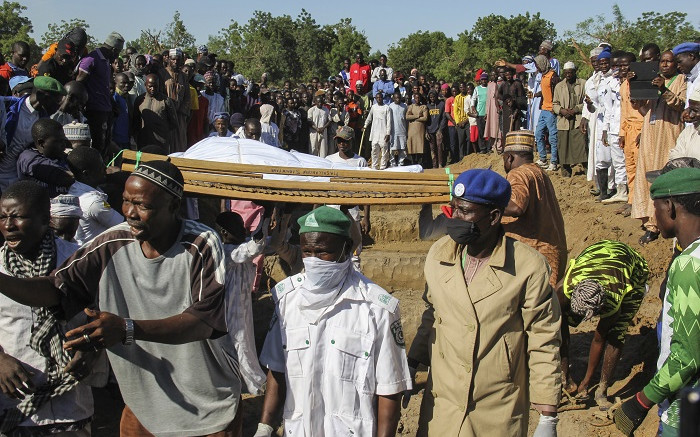[ad_1]
Seventy-six people died, according to authorities. Many were impoverished farm workers who were tied up before their throats were slit.
FILE: Mourners attend the funeral of 43 farm workers in Zabarmari, about 20 km from Maiduguri, Nigeria, on November 29, 2020 after they were killed by Boko Haram fighters in rice fields near the village of Koshobe el November 28, 2020. Image: AFP
KANO – For several days, the killers lived peacefully among their future victims, sharing their bedrooms and eating their food.
Then on Saturday afternoon, they drew their weapons, surrounded the people like cattle, and slaughtered them one by one.
This was the nightmare recounted by survivors of a massacre that unfolded in the rice fields of northeast Nigeria on Saturday.
The bloodbath set a new standard for brutality in Boko Haram’s 11-year jihadist insurgency.
ALSO READ: Boko Haram claims farm massacre in Nigeria rises to 76
Seventy-six people died, according to authorities. Many were impoverished farm workers who were tied up before their throats were slit.
A 24-year-old traumatized survivor, who may be called Abdul, said the killers posed as workers who had come to the fields in Koshobe, Borno state, to do seasonal work.
“I ran errands for them, got them food and washed their dishes,” said Abdul, who arrived with hundreds of people from Kebbi, a poor region 1,000 kilometers away.
About 40 jihadists were involved in the massacre, according to survivors.
‘TACTIC’
In the early afternoon on Saturday, they drew their weapons and led about 60 workers past an abandoned building, Abdul said.
“They separated the elders (from) the rest of us and said that we should take turns paying tribute to their leader who was in the house,” he said.
“But it was just a ploy because whoever came in never came out.”
“At one point one of the insurgents who were guarding us told us that they were massacring us and asked us to flee,” he said. “I was one of the lucky few.”
As he fled, he witnessed the unbearable: “The assailants then launched into a wave of assassinations, capturing workers in the rice fields, tying them up and slitting their throats.”
It appears that the jihadists also attacked workers from the nearby village of Zabarmari, even though the village had a protection agreement with Boko Haram.
Bello Muhammad’s younger brother, Ali, 20, was among the dead.
“They asked who of them was from Zabarmari and my brother immediately stepped forward and was asked to enter the house where he was massacred,” he said, recounting what a witness told him.
“There was an agreement that the jihadists would never attack the residents of Zabarmari, which is why Ali was quick to step forward, thinking that he would be saved.”
43 bodies were found in the building and 33 in the rice fields. It is feared that more have not yet been discovered.
SEARCH FOR BODIES
Crews continued their search for bodies on Tuesday, lumbering through the sprawling swamp on foot, trudging behind tractors.
“It is exhausting work because normal vehicles cannot move in difficult terrain because they will definitely get stuck,” said Abdullahi Umar, a member of the search team.
He described the search as “dangerous” because Boko Haram operates in the area, which has trails that link to their refuge in the Sambisa forest.
At least 36,000 people have died and two million have been displaced since the jihadists launched their bloody campaign in northeast Nigeria in 2009.
The UN, in an early account of the latest massacre, said the assailants arrived by motorcycle, and gave a preliminary death toll, since they retracted 110.
It is not ruled out that several groups have participated.
On Tuesday, Boko Haram said it was “responsible for what happened in Maiduguri in recent days … especially in Zabarmari.”
The killing, it said, was in retaliation for the death of one of its members who had been arrested by the villagers and turned over to the authorities.
Download the EWN app on your iOS or Android device.
[ad_2]
